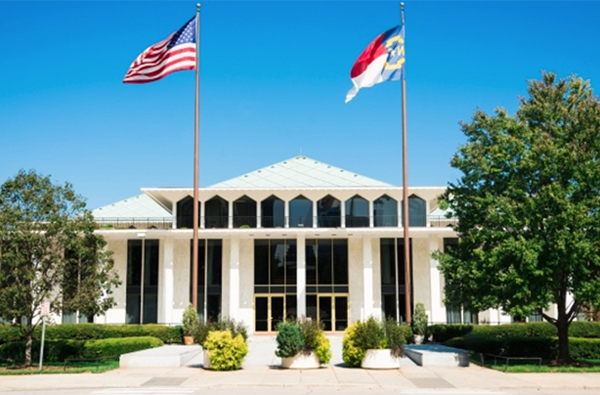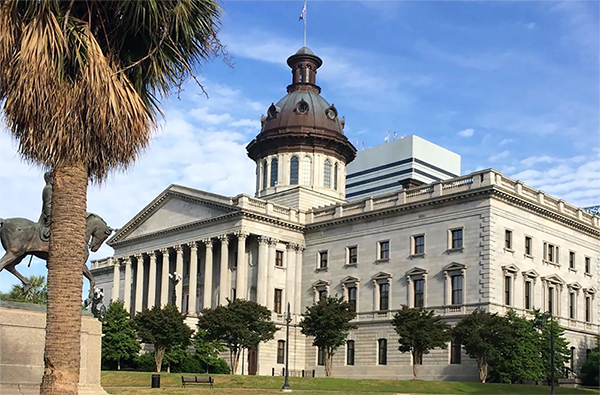Carolinas Clean Energy Business Association
The Carolinas' Voice for the Clean Energy IndustryMajor Legislation Driving Clean Energy in the Carolinas

North Carolina
HB 951
HB 951 was signed into law by Governor Cooper on October 13, 2021, after a two year stakeholder process and months of negotiation. The intent of the law is to reduce carbon emissions through coal retirements, change utility ratemaking, and initiate changes in asset ownership. Several other provisions are included in the law, but these are the major provisions of interest to CCEBA.
Carbon Reduction
HB 951 requires the N.C. Utilities Commission to take “all reasonable steps” to achieve a 70 percent carbon emissions reduction by the year 2030. The carbon reduction set forth in the law is based on Governor Cooper’s aggressive clean energy goals outlined in Executive Order 80.
The carbon reductions are primarily achieved through retirement of uneconomic coal plants. Duke Energy will refinance certain coal plants through low-interest ratepayer-backed bonds in a method called securitization. The N.C. Utilities Commission will develop rules to determine the costs to be securitized.
Ratemaking
HB 951 allows multi-year rate making and performance-based regulation. Duke Energy can issue three-year rate plans and while it caps the rate increases during the second and third years at 4 percent, it does not set a limit for the first year. Duke Energy may get cost-recovery for expenses as they occur. The N.C. Utilities Commission may only approve or deny the multi-year rate plan.
Performance-based ratemaking (PBR) decouples the sale of electricity from the private motive and has benchmarks for energy efficiency, grid resilience, and other operating issues. The NCUC may consider several criteria when evaluating the PBR application including equity in contracting and reduction of low-income energy burden, as well as decreasing peak load, achieving greater energy efficiency and utility scale renewable energy and storage. Finally, the law mandates the N.C. Utilities Commission to use the “minimum system method” to allocate costs across customer classes.
Ownership
HB 951 continues the existing Competitive Procurement of Renewable Energy (CPRE) program under HB 589 into 2022 before establishing a split ownership of 55 percent Duke Energy/45 percent independent ownership program for solar and solar plus storage. Duke Energy will be allowed 100 percent asset ownership for all stand-alone energy storage, onshore wind, and offshore wind resources.
Modification of Existing Power Purchase Agreements
HB 951 gives independent power producers a one-time chance to extend their power purchase agreements with the utility.

South Carolina
Act 62
South Carolina unanimously passed The South Carolina Energy Freedom Act (2019), also known as Act 62, to promote the use of renewable energy and to direct the South Carolina Public Service Commission to treat renewable energy in a fair and balanced way. Act 62 was a comprehensive bill that addressed PURPA implementation, reform of the state’s Integrated Resource Planning Process, revision of state net metering policies, consideration of renewable purchase programs for large customers, and established general principles of rate making that take into consideration customer utilization of distributed energy resources to manage electric bills and contribute to lowering electric system costs.
PURPA
Act 62 requires that the state’s investor-owned utilities offer fixed price PPAs, with a minimum 10-year contract tenor, until installed solar capacity reaches 20 percent of the utility’s retail peak load, at which point the commission has authority to revisit and revise the 10-year minimum contract tenor requirement. Avoided costs will be updated and set by the commission at least every two years.
IRP
Act 62 requires that utility IRPs must incorporate an array of industry best practices when evaluating resource options in the context of cost, reliability, and risk. IRPs must be filed at least every three years and are subject to rigorous commission and intervenor oversight. The commission is statutorily authorized to approve, modify and reject utility IRPs.
Competitive Procurement of Renewable Energy
The commission is authorized by Act 62 to create competitive procurement programs for renewable energy to the extent those programs are deemed to be in the public interest.
C&I Clean Energy Programs
Act 62 requires that the state’s investor-owned utilities create programs for approval by the commission that allow large customers to access clean energy through customer selection of third-party renewable energy facilities and suppliers, as well as directly negotiating pricing with the renewable supplier.
Interconnection
Act 62 requires the commission to revisit and revise the South Carolina Generator Interconnection Procedures to accommodate storage technologies, as well as make any other appropriate changes to the current procedures.
